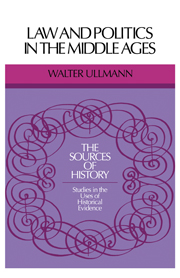Book contents
- Frontmatter
- Contents
- Dedication
- General Editor's Introduction
- Preface
- Abbreviations
- 1 Introduction
- 2 The Roman Law
- 3 The Scholarship of Roman Law
- 4 The Canon Law
- 5 The Scholarship of Canon Law
- 6 Non-Roman Secular Law
- 7 Governmental Doctrines in Literary Sources
- 8 The New Science of Politics
- Select Bibliography
- Index
- Frontmatter
- Contents
- Dedication
- General Editor's Introduction
- Preface
- Abbreviations
- 1 Introduction
- 2 The Roman Law
- 3 The Scholarship of Roman Law
- 4 The Canon Law
- 5 The Scholarship of Canon Law
- 6 Non-Roman Secular Law
- 7 Governmental Doctrines in Literary Sources
- 8 The New Science of Politics
- Select Bibliography
- Index
Summary
Among the legal systems in medieval Europe Roman law assumed an importance superior to all: its impact upon governmental practice and science was without parallel. This is partly because Roman law was a mature expression of the most Roman of all Roman ideas—the idea of law and order; partly because of the influence it exercised directly or through the medium of the Bible; and partly as the instrument that forged social relations, shaped intellectual habits and created a mode of thinking which was unique in the history of civilization. It indelibly imprinted its seal on the physiognomy of what came to be Western Europe and in fact played a major role in its making. The Roman law in the shape it received in Justinian's codification—and it is this which commonly represents Roman law—embodied a great many governmental ideas and principles as they came to be evolved in late republican and especially in imperial times. Whether this Roman law had all the superlative qualities with which some legal historians have credited it may be open to doubt, but what matters is not so much the intrinsic quality of this law, which certainly was very high, but the influence which it exercised on the evolution of governmental practice and theory. Within the ambit of governmental science it is not the technicalities of Roman law as a positive law which demand attention, but the general jurisprudential axioms and principles enshrined in it. As Maitland once expressed it, Europe without the Digest would not be the Europe that we know.
- Type
- Chapter
- Information
- Law and Politics in Middle Ages , pp. 51 - 80Publisher: Cambridge University PressPrint publication year: 1976



